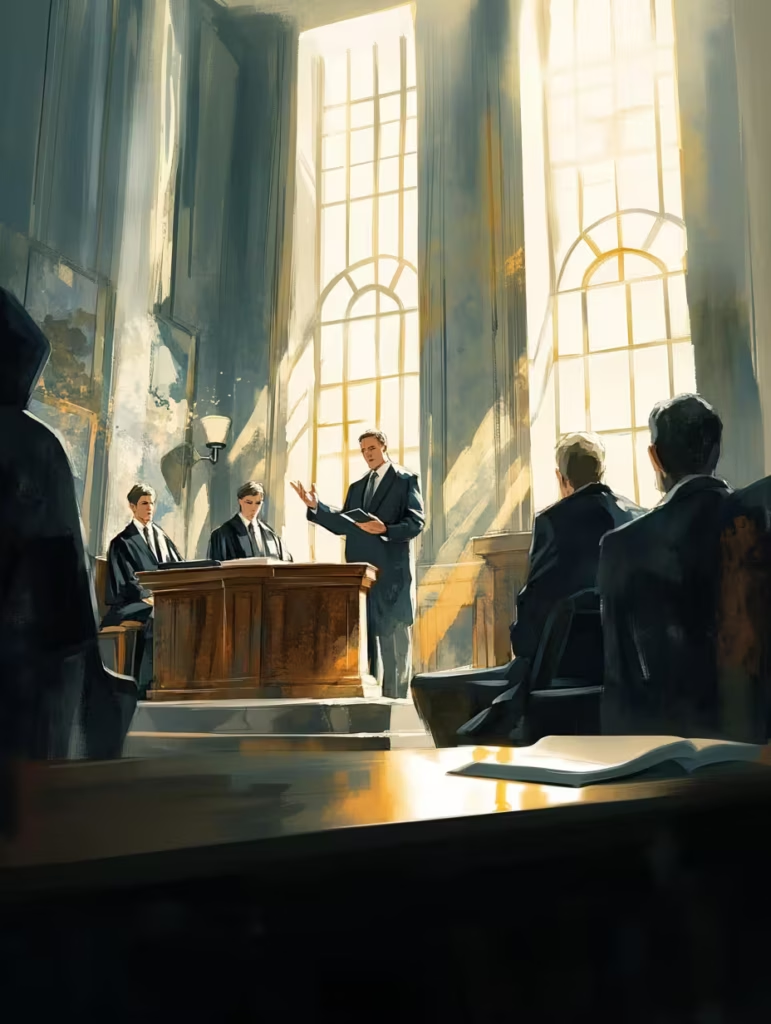Uniform Public Expression Protection Act (UPEPA), Anti-SLAPP Litigation & Appeals in Utah
A Guide for Utah Attorneys
An Introduction to UPEPA in Utah –Protections, Process, and Anti-SLAPP Safeguards
The Utah Uniform Public Expression Protection Act (UPEPA) and its Anti-SLAPP provisions shields individuals and entities from meritless lawsuits that seek to suppress public speech. Utah’s version has distinct procedural aspects and remains untested in its appellate courts. UPEPA allows for early dismissal of baseless claims, stays discovery, and grants an immediate right to appeal. It protects free speech, press, petitioning, and artistic expression while excluding commercial speech, and its fee-shifting provision deters abusive litigation.
For additional information on UPEPA see July-August 2025 of the Utah Bar Journal page 40.
UPEPA is A Powerful Tool Against SLAPP Lawsuits
The Utah Uniform Public Expression Protection Act (UPEPA) (Utah Code 78B-25) provides a robust framework for examining lawsuits targeting political speech, speech in the public square, and other protected activities. Designed to protect individuals from SLAPPs (Strategic Lawsuits Against Public Participation), UPEPA aims to dismiss meritless lawsuits intended to silence individuals or organizations engaged in public discourse.
Attorneys practicing in Utah should attempt to understand the scope of UPEPA’s protections, its unique and slightly unusual procedural aspects, and any potential appellate issues you might need to preserve in order to litigate UPEPA issues competently in the district court and appellate courts.
UPEPA is not governed by Anti-SLAPP statutes or case law From other jurisdictions
First things first. Utah’s UPEPA has not been interpreted by Utah’s appellate courts as of February 2025. So no case law governs the way our courts will interpret UPEPA here in Utah.
UPEPA is a unique statutory scheme, and it is uniquely adopted into each jurisdiction that has adopted it. UPEPA differs from other Anti-SLAPP statutory schemes.
Utah’s UPEPA includes a provision stating that “uniformity” with other jurisdictions that have adopted “this uniform act” is one consideration in the way we will interpret our statutory scheme. But that does not mean that it must be interpreted consistently with other jurisdictions that have adopted the uniform act, and it certainly does not mean that Anti-SLAPP case law in other jurisdictions controls here. That is because reference to “uniform act” directly refers to UPEPA and does not on its face appear to include general Anti-SLAPP statutes around town.
Section 112 of the Act states, “In applying and construing this uniform act, consideration shall be given to the need to promote uniformity of the law with respect to the uniform law’s subject matter among states that enact the uniform law.” Utah Code Ann. section 78B-25-112.

But nothing in this language suggests that it should be construed consistently with any Anti-SLAPP statute—including California’s. Parties hoping to argue that Anti-SLAPP case law applies in Utah should make a plain language argument comparing UPEPA to the Anti-SLAPP statute in question, arguing their similarity, and asking the court to adopt that jurisdiction’s holding or rationale.
And under the language of section 112, Utah Appellate courts do not have to wholesale adopt the UPEPA rulings of other jurisdictions either. The legislature merely advised that our appellate courts should consider uniformity in rendering decisions: “consideration shall be given to the need to promote uniformity.” This still leaves our courts—appellate and district—open to a robust plain language analysis under the terms of our statute.

The Purpose of UPEPA
Understanding UPEPA’s Role in Protecting Public Expression
UPEPA was enacted to protect individuals and entities from meritless lawsuits that arise from their participation in acts of public expression. Those acts include speech, press, and petitioning activities.
These lawsuits, sometimes filed to intimidate or financially burden actors—especially in the political realm—can stifle free expression and political activity. UPEPA ensures that those engaging in constitutionally protected activities have a mechanism to seek early dismissal of frivolous claims while also safeguarding legitimate legal actions from unwarranted dismissals.
It’s important to understand that the First Amendment does not protect people from other people’s speech. But when people participate in activity that falls under First Amendment protections, UPEPA kicks in to allow the district court a mechanism to examine the case—and to potentially dismiss the case early—when the defendant actor can show that there is no merit.
In this respect, UPEPA is meant to weed out meritless claims made for the sole purpose of harassing and hampering protected speech. It is not meant to kick out the meritorious claims of real people against other people or entities.
And UPEPA does not dismiss a claim merely because the Act applies. If the Act applies, then the district court can take a good look at the case early and give the defendant an opportunity to file a motion for summary judgment earlier than usual. It does not necessarily follow that the defendant actor will win.
Key Provisions of UPEPA
1. Scope of the Act
The Act’s broad scope is found in section 102. But it can be difficult to understand UPEPA’s Scope language at a glance. That is because reading UPEPA requires you to sit, focus, and figure out the “applies” and “does not apply” language and what it means in practice. As above, “applies” does not mean that the cause of action is immediately dismissed. Application of UPEPA to a cause of action only means that the court will take a close look early on. That is all.
The “applies” language should be read in context. For example, the language “this chapter applies” and “this chapter does not apply” can be difficult to follow. To understand what applies and when, it can be helpful to interpret the words “this chapter applies” as saying “UPEPA protects” and “this chapter does not apply” to mean “UPEPA does not protect.”
UPEPA “shall be broadly construed” and applied to—or protects—legal claims arising from:
- Free speech in a public forum related to an issue of public concern.
- The right of freedom of speech and of the press.
- The right to petition the government.
- The right of association.
- The right to assemble.
UPEPA also provides protections—but not as broadly—for the arts. It explains that it does not protect normal run-of-the-mill businesses who are “selling goods and services” and their sales or marketing communications. However, the “goods or services” language does not include “the creation, dissemination, exhibition, or advertisement or similar promotion of a dramatic, literary, musical, political, journalistic, or artistic work.” Thus, UPEPA does not protect normal businesses promoting their products unless their goods and services include the artistic works mentioned above. The language “goods and services does not include” in fact means that UPEPA does protect those categories. This is an exemption from non-protection. Utah Code Ann. section 78B-25-102.

This broad application ensures that individuals engaged in public—not private—discourse are protected from litigation designed to harass them and suppress their speech.
Again, UPEPA is not designed to dismiss meritorious claims.

2. Expedited Dismissal Procedure
The power of UPEPA is its fast-tracked dismissal process. A defendant should file a motion to dismiss early in the litigation. Section 103 provides that a party should filed “a special motion for expedited relief to dismiss the cause of action” within 60 days on which that party is served the complaint. Utah Code Ann. section 78B-25-103. However, for “good cause” shown, a party may file after this 60-day deadline. Once the motion is filed, the following happens:
- The burden shifts to the plaintiff to demonstrate the legal sufficiency of their claim.
- Discovery is stayed while the motion is pending, preventing costly and unnecessary litigation burdens.
- The defendant can move for summary judgment before discovery.
- The court is required to rule on the motion promptly, ensuring a quick turnaround.

UPEPA’S Process
UPEPA’s process is kind of weird. When a defendant files a motion for expedited relief (or a motion to dismiss) under UPEPA, no discovery has taken place and the case enters a mandatory stay.
So let’s talk about the stay, and let’s talk about discovery during the stay.
Stay. Under UPEPA, once a defendant files a motion to dismiss, all proceedings are stayed, and a district court has 60 days to hear the motion, unless the court grants a party’s motion for further discovery or there is good cause for an enlargement of time within which to hear the motion. But delay under this provision is not endless. If the district court allows for additional discovery under section 104, then it must hear the motion within 60 days of allowing additional discovery.
Discovery. A party seeking additional discovery should not hesitate to tell the court that it in fact needs the discovery in order to survive. Under section 104, “the court may allow limited discovery if a party shows that specific information is necessary to establish whether a party has satisfied or failed to satisfy a burden . . . and the information is not reasonably available unless discovery is allowed.” Utah Code Ann. section 78B-25-104.
What the court should consider. In ruling on the motion to dismiss, the district court must consider “the pleadings, the motion, any reply or response to the motion, and any evidence” that it could consider in ruling on a motion for summary judgment. Utah Code Ann. section 78B-25-106 (“In ruling on a motion under Section 78B-25-103, the court shall consider the pleadings, the motion, any reply or response to the motion, and any evidence that could be considered in ruling on a motion for summary judgment under Utah Rules of Civil Procedure, Rule 56.”).
This is just one example of the way Utah’s UPEPA statute differs from California’s Anti-SLAPP statute. In Utah, section 106 lists a much wider panoply of things for the court to consider than the Anti-SLAPP statute in California, where, under the plain language there, the superior court is limited to considering the pleadings and supporting and opposing affidavits alone. California Code Ann. section 425.16 Anti-SLAPP motion (“In making its determination, the court shall consider the pleadings, and supporting and opposing affidavits stating the facts upon which the liability or defense is based.”)
Ruling. Once the trial court has heard the motion, the court “shall rule on a motion” no longer than 60 days after the day of the hearing on the special motion to dismiss. The stay on all other proceedings is in effect until the court rules on the motion and the 21-day period within which to file an appeal has run. If the losing party files an appeal, all other proceedings are stayed “until the day on which the appeal concludes.” Utah Code Ann. section 78B-25-104. “The day on which the appeal concludes” might mean the day on which the opinion is published. However, under the Utah Rules of Appellate procedure, a losing party on appeal may in turn file a petition for writ of certiorari in the Utah Supreme Court or it may file a motion for rehearing in the Utah Court of Appeals. This likely means the litigation will continue to be stayed if either party files either of those motions. It would be a good idea for the party considering filing these motions to advise the district court of its plans.
Attorney fees motion. While all other proceedings are stayed during this timeframe, it is important to note that a motion for attorney fees under section 110 is not. That means that the winning party may move the court immediately for attorney fees under section 110.
The stay also does not prevent a party from voluntarily withdrawing a cause of action or part of a cause of action or moving to sever a cause of action. This can be a significant consideration in negotiations.
During the stay, the court may also hear motions that are unrelated to the UPEPA motion to dismiss, as well as injunctions to protect against “an imminent threat to public health or safety.” Utah Code Ann. section 78B-25-104.
3. Attorney Fees and Costs
If a UPEPA motion is successful, the prevailing party is entitled to recover attorney fees and costs. Utah Code Ann. section 78B-25-107.
But a plaintiff can also move for attorney fees if the court determines the special motion to dismiss under UPEPA was frivolous or filed “with the intent to delay the proceeding.”
It’s important to note that if a defendant moves for dismissal under UPEPA and a plaintiff responds by voluntarily dismissing its complaint without prejudice, the defendant may still seek attorney fees. And if a plaintiff moves for voluntary dismissal with prejudice, the defendant may still seek attorney fees, and the voluntary dismissal with prejudice establishes for purposes of attorney fees “that the moving party”—the defendant—“prevailed on the motion.” Utah Code Ann. section 78B-25-107.
The broad attorney fees provision itself will disincentivize many parties from bringing these types of claims—and defending them through appeal. Thus, courts must be very careful in assessing which complaints warrant dismissal due to lack of merit at this stage.

4. Appellate Rights
A key aspect of UPEPA is the right to an immediate appeal if a motion to dismiss is denied. This ensures that defendants can seek appellate review before engaging in prolonged litigation, preserving the purpose of the statute. Utah Code Ann. section 78B-25-109.
But make sure you pay attention to deadlines. UPEPA appeals are subject to rule 4 of the Utah Rules of Appellate Procedure and that rule’s ordinary guidelines. Rule 4 explains that notices of appeal brought under UPEPA must be filed with 21 days after the date of entry of the order appealed from.
If you are the plaintiff and you have lost at any step along the way, make sure that you file a cross-appeal with 14 days of the defendant’s notice of appeal. That preserves your right to contest the rulings of the district court that you lost—even if you won against the motion to dismiss.
The time within which to file the notice of appeal is tolled by filing certain motions listed in Rule 4, like a claim for attorney fees under rule 73 of the Utah Rules of Civil Procedure. Ensure you are familiar with these filings.
As with all appeals, the party filing the notice of appeal is responsible for ordering court transcripts and for paying the transcriber. But if the plaintiff—or appellee—believes any transcripts or evidence is missing from the record, the plaintiff may move under rule 11(f) of the Utah Rules of Appellate Procedure to supplement the record.
And don’t forget to ask the Utah Supreme Court to retain the case within a few days of the notice of appeal being filed. After the case is transferred to the Utah Court of Appeals—only a few days after filing the notice of appeal—the only way to get the case back in the Utah Supreme Court is by filing a suggestion of recall in the Utah Court of Appeals. And the court of appeals is unlikely to suggest recall in such an interesting case.
Application of UPEPA to Movie Studios and Publishers
UPEPA’s protections are relevant to movie studios, book publishers, and other media companies that frequently face lawsuits related to their expressive works. The statute can help these entities defend against claims intended to suppress or penalize creative and journalistic expression.
1. Defamation and Right of Publicity Claims
Movie studios and publishers often face lawsuits alleging defamation or violations of an individual’s right of publicity. For example:
- A book detailing public figures’ controversies may lead to defamation claims, even if the content is factually accurate or based on opinion.
- A film depicting real-life events might prompt lawsuits from individuals unhappy with their portrayal.
Under UPEPA, these types of claims could be dismissed early if they arise from protected speech on matters of public concern and if the plaintiff fails to make a prima facie showing of each essential element of the causes of action she is bringing. Under the prima facie standard, plaintiffs would have to proffer evidence relevant to each element of the cause of action to proceed with the lawsuit.
2. Claims Against Documentary Filmmakers and Investigative Journalists
Investigative reporting and documentary filmmaking often involve discussing controversial or politically sensitive issues. A documentary exposing corruption or misconduct might attract retaliatory lawsuits aimed at suppressing the information.
- UPEPA can be invoked to dismiss such lawsuits if they are found to be meritless attempts to silence journalistic expression.


3. Fictional Works and Libel-in-Fiction Lawsuits
Authors and screenwriters frequently face “libel-in-fiction” lawsuits where plaintiffs claim that fictional characters are based on them in a defamatory way. Courts typically recognize that fictional works are protected as artistic expression.
- UPEPA could be used to dismiss such claims early, preventing costly litigation over creative works unless a plaintiff can show a genuine legal basis for their case.
4. Movie Studios Facing Lawsuits Over Content-Based Decisions
Sometimes, movie studios or publishers are sued for making editorial or content decisions—such as cutting scenes, canceling contracts, or declining to publish specific material. These lawsuits may be framed as breach of contract or unfair business practices but often involve efforts to compel or restrict speech.
- UPEPA’s application to expressive conduct could allow for early dismissal of such claims when they interfere with editorial discretion.
Conclusion
UPEPA represents a critical development in Utah’s legal landscape, offering protections for individuals and entities engaged in public expression while ensuring that legitimate claims can proceed. For attorneys, understanding UPEPA’s procedural mechanisms and appellate implications is key to effectively advocating for clients. By leveraging the statute’s protections and navigating its appellate issues strategically, attorneys can ensure that the principles of free speech and fair litigation remain upheld in Utah’s courts.
If you need experienced appellate counsel for a UPEPA appeal, Lotus Appellate Law is here to help. Contact us today to protect your rights and ensure your case is handled with the expertise it deserves.
What Our Clients Are Saying: “Trusted Expertise in Appellate Law”
Compare Us
Should you Hire an Appellate Law Firm?Frequently Asked Questions
Utah Appellate Process